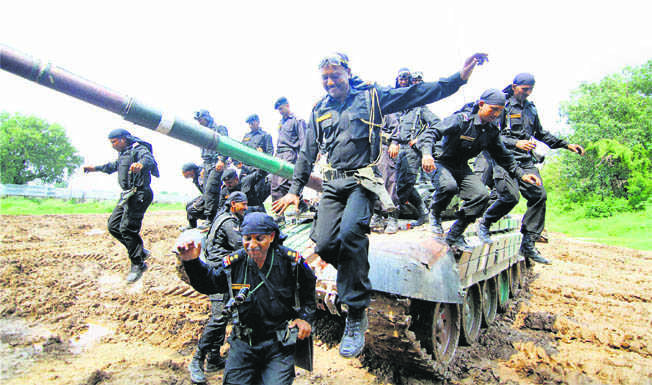
Army personnel raising slogans near the T72 Tank, during an event in Jammu, to mark the victory of the 1965 India-Pak war. PTI
Arun Joshi
WITH the Rashtriya Swayam Sewak Sangh telling its disciple Prime Minister Narendra Modi to “engage with Pakistan” as the neighbouring country is a “brother,” has lifted much of the hawkish pressure from his shoulders. Hitherto, it was widely understood that the hawks in the Sangh Parivar of which BJP is a critical part, wanted him to show a hard and stern face to Pakistan.
The belligerent noises from Pakistan's civilian and military leadership, threatening the use of nuclear weapons and inflicting such losses that India would remember for years, had provoked an equally aggressive rhetoric from the Indian military leadership. The war rhetoric was threatening to reach a crescendo. The past experience is that whenever that happens, the two nuclear power nations often revisit borders before sitting across the table, be it at Tashkent, Simla or Islamabad.
Modi was caught in a dilemma because he has a past which he cannot whitewash. His election-time rhetoric (that he has a 56-inch chest to deal with Pakistan) has come to haunt him. At the same time, he had also declared that he would follow in letter and spirit the path laid out by his illustrious predecessor Atal Behari Vajpayee in resolving the Kashmir issue. And, his immediate predecessor Manmohan Singh had drawn another roadmap in which he had placed internal and external dimensions at the heart of the solution to Kashmir issue, the external dimension clearly meant a sincere and result-oriented dialogue with Pakistan. That was in 2006 , much before the 26/11 terror assault, the perpetrators of which operated from Pakistan and were still enjoying the official-cum-military patronage.
Modi has got the endorsement for holding talks with Pakistan from all quarters. Kashmir-centric parties, be it Peoples' Democratic Party or the National Conference, whose patriotism depends on whether they are in power or not, are also egging on Modi to play the role of a “big brother” and show a “big heart” and hold the hand of Pakistan" in resolving the issues of terrorism and Kashmir. This is a sort of national consensus, because there is no escape, whatsoever, from dialogue with Islamabad. This irony was visible last August before and after the collapse of the National Security Advisor-level talks, as a sequel to the joint statement read out in Ufa, Russia, on July 10, after Modi and Nawaz Sharif met to re-open the dialogue process to tackle the menace of terrorism plaguing the region. Kashmir would have automatically figured in the talks as Pakistan had made Kashmir as a staging ground for jihadi attacks in other parts of the country, including the terror assault on the Indian Parliament in December, 2001. That attack had resulted in the coercive diplomacy through “Operation Parakram”, based on the theory of cold start strategy. Finally, the shuttle diplomacy by the US and British diplomats defused the tension and the troops were back to barracks after spending almost one year in eyeball-to-eyeball mode on the borders.
Something different is happening this time. Pakistan is working on a three-fold strategy. One, it has made the borders and the Line of Control (LoC) in Jammu and Kashmir hot and in a very calculated move, paints itself as a victim before the world. The Indian retaliation to the unprovoked firing and shelling from the Pakistani side causes casualties on the other side as well. Islamabad's diplomats and military leaders show it to the world as “aggression” by India and place this before the international fora, seeking global intervention. Pakistan never tells what it has done to the civilians and soldiers on this side of the border. India's diffidence in contesting Pakistan's claims diplomatically is taken as sign of weakness.
Second, Pakistan has reactivated the terrorist-recruiting networks in Kashmir in a big way, though it had never turned off its terror tap altogether. For the first time in years, militants have set up their bases. Infiltrators coming from across the border are finding willing recruits and even policemen have joined their ranks. The denial by the Indian Army and the border guards that infiltration bids have been successful have sought to inject a sense of complacency. This is causing more problems, encouraging Pakistan to push in more and more infiltrators from its launching pads. According to Indian sources, there are as many as 42 of them close to the LoC.
Third, Pakistan has started using social media to inject the communal note. The PDP-BJP government has come as a boon for it. Radicalisation is peaking and anti-Hindu propaganda is competing with anti-India songs sung passionately by young children.
This is a dangerous mix. It needs to be addressed. It cannot be addressed unless the channels of communication are open. Let Modi travel his own path. Vajpayee's 2003 and Modi's 2015 sit 12 years apart. Neither is this Mufti Mohammad Sayeed government in 2002 and nor can Modi be expected to make himself hostage to the Vajpayee mantra on Kashmir and Pakistan.
The logical extension of this question is whether Modi is morally, politically and diplomatically bound to travel the path laid out by Atal Behari Vajpayee. The road to peace has only one channel and that is sitting across the table.
Now, when he has national support for it, let terror and talks go together. The world is falling apart in the Middle East, and Europe is facing the worst-ever refugee crisis; but the very same world is showing the triumph of diplomacy in US, Iran, Cuba. India and Pakistan cannot overlook that. One baby step by India will bring down all the war narrative that has tempered the lexicon after the collapse of the NSA-level talks.



























